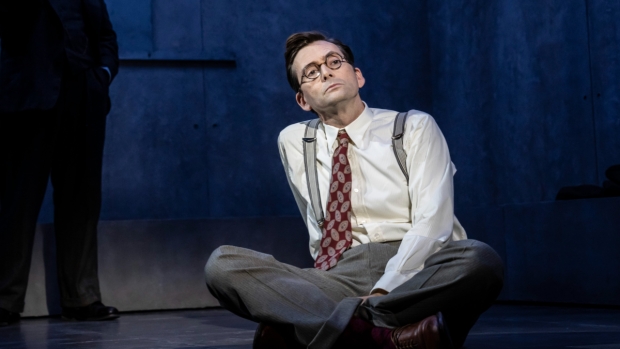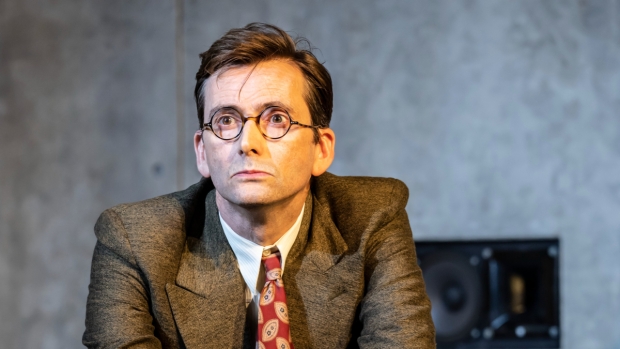”Good” review – David Tennant plots a man’s descent into evil in West End revival

© Johan Persson
The protagonist here is Halder, a professor of literature in Frankfurt, who has written a novel on euthanasia, spurred partly by his experience with his own blind and demented mother, which brings him to the approving attention of the Third Reich. At the start of the play, in 1933, he is chatting to his best friend – his only friend – Maurice (Elliot Levey), a Jewish psychiatrist, about his belief that all that “anti-Jew rubbish” is “just balloons they throw up in the air to distract the masses.”
By the close, as a member of the Nazi party, Halder has been actively involved in every stage of the atrocities that led inevitably to the obscenity of the Holocaust – from book burning, to Kristellnacht – without ever once losing his sense that he is doing nothing wrong.
The action unfolds like a dream play, in fragments floating through Halder’s mind. Director Dominic Cooke has taken the radical decision to reduce a large cast to three, with Tennant playing only Halder, but Levey and Sharon Small taking multiple parts. This increases the claustrophobia and neurosis of Halder’s journey, as does Vicki Mortimer’s plain walled, cell-like set.

© Johan Persson
But it also confuses an already difficult text. In particular, it is hard for Small to switch between Halder’s mother, his depressed wife Helen and the sprightly student Anne, for whom he leaves Helen and his children. She discovers poignancy, particularly as Helen, and also adeptly turns her hand to playing a variety of high-ranking SS officials, but the constant switching of voice in an already fragmented text flattens the trajectory of Halder’s descent.
The strength and subtlety of Taylor’s writing lies in his ability to suggest the varied ways people delude themselves by shutting out realities in front of them. Halder’s ultimate betrayals are suggested by his ability to blind himself to his smaller failures; his abandonment of those closest to him, his narcissism, his inability to listen to any voice other than his own. The band he hears in his head is obliterating his guilt and his conscience, allowing him to argue that burning books is a way of improving educational attainment and that driving Jews out of their homes is warning them to leave the country.
Writing in 1981, Taylor was describing Nazi Germany but also suggested in his author’s note that he was thinking of the ‘crimes’ of the West against the Third World – “my part in the Auschwitzes we are all perpetrating today”. This sense of constant moral equivocation, of hypocrisy, and of the small compromises that allow evil to thrive, is what makes the play of ongoing universal significance.
In this context, Tennant is perfect casting. He has a remarkable ability as an actor to suggest a darkness beneath an affable surface. His quick charm, his nervy smiles, conceal an emptiness that is always there. His irritation with his mother is fired by a terrible nervous tension. He’s always selfish, even when he is pretending to be concerned. As the play progresses, his mouth tightens, his chin lifts, and his body seems to constrict.
It’s a chilling performance rather than a moving one. Which leaves it to Elliot Levey to locate the play’s emotion. He does this perfectly, encapsulating Maurice’s humour and gentleness, and the way they struggle against his rising panic. He holds both sadness and affection in his face, as he listens to Halder’s constant self-justification; his eyes light with anger when he hears him asking why Jews didn’t leave when they could.
The moral emptiness behind that lie rings through the night. Good isn’t perfect, but its lessons demand to be understood.












